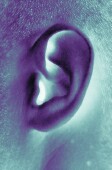 |
 |
 |

Scans Show Sound-Processing Deficits in Autistic Kids
Difficulty may underpin language, listening impairments found in disorder, study says|
|
HealthDay
By Kevin McKeever
Monday, December 1, 2008
 MONDAY, Dec. 1 (HealthDay News) -- Children with autism spectrum disorder process sounds a fraction of a second slower than other children, an abnormality that offers insight into listening and language issues linked to the condition, a new study says.
MONDAY, Dec. 1 (HealthDay News) -- Children with autism spectrum disorder process sounds a fraction of a second slower than other children, an abnormality that offers insight into listening and language issues linked to the condition, a new study says.
Researchers used magnetoencephalography (MEG), which records minute magnetic fields associated with electrical brain activity, to detect the slight delay in autistic children who were exposed to beeps, tones in pairs, vowels and sentences at different speeds, tones and frequencies.
The findings were expected to be presented Monday at the annual meeting of the Radiological Society of North America (RSNA), in Chicago.
"This delay in processing certain types and streams of sound may underpin the subsequent language processing and communication impairment seen in autistic children," researcher Timothy Roberts, vice chair of research in the department of radiology at Children's Hospital of Philadelphia, said in a news release issued by the RSNA.
This signature of autism found in brain activity may eventually become a biomarker to improve classification of the disorder and aid in treatment and therapy planning, he added.
"We hope that in the future, these signatures will also be revealed in the infant brain to help diagnose autism and allow earlier intervention," he said.
Autism inhibits the brain functions that govern the development of social and communication skills. About one in every 150 American children, mostly boys, is affected by the condition, according to the Autism Society of America.
HealthDay
Copyright (c) 2008 ScoutNews, LLC. All rights reserved.
Related News:
More News on this Date
Related MedlinePlus Pages:
| Home | Health Topics | Drugs & Supplements | Encyclopedia | Dictionary | News | Directories | Other Resources | |
| Disclaimers | Copyright | Privacy | Accessibility | Quality Guidelines U.S. National Library of Medicine, 8600 Rockville Pike, Bethesda, MD 20894 National Institutes of Health | Department of Health & Human Services |
Date last updated: 02 December 2008 |




